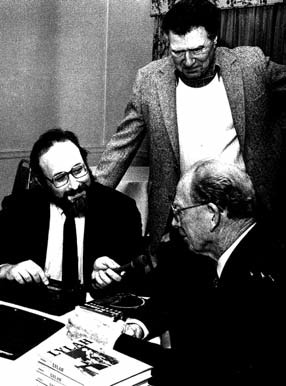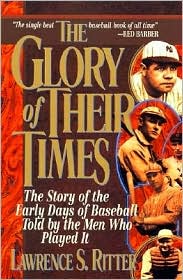The Origins and History of the Larry Ritter Book Award
This article was written by John McMurray
This article was published in SABR Deadball Era newsletter articles
Editor’s note: This article originally appeared in the SABR Deadball Era committee’s April 2016 newsletter.
The announcement of the winner of the 2016 Larry Ritter Book Award, Ty Cobb: A Terrible Beauty by Charles Leerhsen, provides an excellent opportunity to discuss the origins and history of the award.
 Now in its 15th year, the Ritter Award has been a centerpiece of the Deadball Era Committee almost from its start. Approximately one year after the Committee was formed in 2000, Tom Simon, now DEC Chair Emeritus, decided to present an award to the best book set primarily in the Deadball Era published during the year prior. A proposal for such an award was introduced at the Deadball Era Committee meeting at SABR 31 in Milwaukee and subsequently approved.
Now in its 15th year, the Ritter Award has been a centerpiece of the Deadball Era Committee almost from its start. Approximately one year after the Committee was formed in 2000, Tom Simon, now DEC Chair Emeritus, decided to present an award to the best book set primarily in the Deadball Era published during the year prior. A proposal for such an award was introduced at the Deadball Era Committee meeting at SABR 31 in Milwaukee and subsequently approved.
The first Ritter Award subcommittee consisted of Simon, Al Blumkin, Scott Flatow, David Shiner, and Dick Thompson, and was chaired by Paul Rogers. The group corresponded by e-mail for the first time in 2002, and while it was too late to select a winner in time for that year’s Boston convention, the first winner was Martin Kohout’s Hal Chase: The Defiant Life and Turbulent Times of Baseball’s Biggest Crook. Kohout was grateful for the award, writing: “My heartfelt thanks to the award committee, and to all of you for making the DEC such an example of scholarly generosity and fellowship in action.”
Including Ritter’s name on the award was the natural choice, according to Simon. Ritter, of course, was known for his groundbreaking book of oral history, The Glory of Their Times: The Story of the Early Days of Baseball Told by the Men Who Played It, which brought the Deadball Era to life and which is often cited as the greatest baseball book ever published.
Ritter, in fact, became a member of the Deadball Era Committee near its start, writing to Simon in an e-mail (published here and below with Simon’s permission) that “John Thorn tells me you are chairing an underground society devoted to the memory of such as Terry Turner, Dode Paskert, and Germany Schaefer. What Rites of Passage must I undergo to join? If they are not too strenuous, please count me in.”
Simon says Ritter had only one request when told that the award would be named in his honor. Rather than the more formally named Lawrence S. Ritter Award, which was the name Simon initially proposed, Ritter himself requested that the prize be named the Larry Ritter Award — which it is.
Ritter Award winners over time have focused on a range of subjects and topics. The 2003 winner was Jim Reisler’s Before They Were The Bombers: The New York Yankees’ Early Years, 1903-1915. Then came The Tour to End All Tours: The Story of Major League Baseball’s 1913-1914 World Tour by James E. Elfers. The next three were The American Indian Integration of Baseball by Jeffrey Powers-Beck; Peach: Ty Cobb in His Time and Ours by Richard Bak; and Burying the Black Sox: How Baseball’s Cover-Up of the 1919 World Series Fix Almost Succeeded by Gene Carney.
Biographical books have been frequent winners, including Norman Macht’s Connie Mack and the Early Years of Baseball (2008), Native American Son: The Life and Sporting Legend of Jim Thorpe by Kate Buford (2011), Spitballing: The Baseball Days of Long Bob Ewing, by Mike Lackey (2014), and Ty Cobb: A Terrible Beauty by Charles Leerhsen (2016).
Two books on the Federal League have also won: first, The Federal League of Base Ball Clubs: The History of an Outlaw Major League, 1914-1915 by Robert Peyton Wiggins, and later, The Battle That Forged Modern Baseball: The Federal League Challenge and Its Legacy by Daniel R. Levitt.
 During the past 15 years, there have been two winning books about ballparks, namely Ballparks of the Deadball Era: A Comprehensive Study of Their Dimension, Configurations, and Effects on Batting, 1901-1919 by Ronald M. Selter, and Fenway 1912: The Birth of a Ballpark: A Championship Season, and Fenway’s Remarkable First Year by Glenn Stout.
During the past 15 years, there have been two winning books about ballparks, namely Ballparks of the Deadball Era: A Comprehensive Study of Their Dimension, Configurations, and Effects on Batting, 1901-1919 by Ronald M. Selter, and Fenway 1912: The Birth of a Ballpark: A Championship Season, and Fenway’s Remarkable First Year by Glenn Stout.
There has also been one tie in the voting, resulting in the presentation of two awards last year, to Nathaniel Grow for Baseball on Trial: The Origins of Baseball’s Antitrust Exemption, and to Chuck Kimberly for The Days of Wee Willie, Old Cy and Baseball War: Scenes from the Dawn of the Deadball Era, 1900-1903.
In the award’s history, there have been five Ritter Award subcommittee chairs. Paul Rogers oversaw the award’s first six years; then I succeeded him; followed by Gabriel Schechter, Dr. Gail Rowe, and now Doug Skipper.
Over time, the voting process has remained quite consistent. Through December 31 of each year, the panel considers nominations for the award, with its chief eligibility concern being whether the book’s central focus is on Deadball Era baseball. Publishers have been kind enough to provide members of the subcommittee with review copies of a particular book. Some books begin arriving to subcommittee members in the fall, with a steady flow continuing into the winter months.
Though books of history have exclusively been candidates in recent years, books of fiction with a Deadball Era-focus are eligible also, and several works of fiction have been considered for the award. Members read and review the books prior to submitting a list of votes for four finalists by March 1. Then, with the list of candidates reduced to four and the finalists having been announced publicly, subcommittee members vote for a winner by April 1 which is routinely announced by April 15.
During the entire process, members are encouraged to discuss their opinions about particular books with the entire subcommittee. Sometimes the subcommittee has been large — peaking at 11 voters — to the more compact seven-member panel that decided on this year’s award, consisting of myself, Mark Dugo, David Fleitz, Craig Lammers, Mark Pattison, Tom Simon, and Skipper (chair). The annual award presentation is a highlight of the DEC meeting at the SABR Convention.
In selecting the ‘best’ book focusing on the period, several considerations can come into play. While the subcommittee has never issued a list of criteria for award winners, it is reasonable to infer that the panel cares a great deal about the originality of a particular topic or approach, historical accuracy, quality of writing, and depth of research. The selection process is a holistic one, and there is no restriction or limitation on which factors voters may use in making their choices.
While the Ritter Award winners justifiably receive the most attention, it is worthwhile to remember the depth and breadth of the candidates the subcommittee considers each year. It is rare for the panel to receive fewer than 10 books to review, and it is striking how active the area of Deadball Era scholarship remains.
The 2013 finalists, for instance, included biographies of Jimmy Collins and Chief Meyers and a book by Joel Franks titled The Barnstorming Hawaiian Travelers: A Multiethnic Baseball Team Tours the Mainland, 1912-1916. Over time, nominees have included biographies of Chief Bender, Johnny Kling, and Napoleon Lajoie, among others, and candidates have been in the form of ebooks, books about teams, and compilations of player biographies.
In a January 2000 e-mail provided by Simon, Larry Ritter listed his favorite baseball books when completing a Deadball Era Committee survey. In order, he listed: “Glory of Their Times, You Know Me Al, Eight Men Out, Baseball As I Have Known It, My Baseball Diary (Farrell), Cobb, My Life in Baseball, Seasons Past (Damon Rice), Baseball’s Golden Age (McCabe), The Unforgettable Season (Fleming), and any Troy Soos book.”
A day later, Ritter wrote again to Simon, saying: “I would like to take this opportunity to change my answer to one of the questions in your survey. Namely, in Question #4, please take out Cobb, My Life in Baseball and in its place put Lefty O’ the Big League by Burt L. Standish. Finally, I am not sure whether or not James Farrell’s My Baseball Diary qualifies as a book about the Deadball Era. If it doesn’t qualify, then please replace it with The Celebrant by Eric Rolfe Greenberg [italics added].” In the same survey, incidentally, Ritter responded to a question about whether he would approve of the DEC publishing a twice-annual newsletter titled The Inside Game by writing: “Suits me.”
Indeed, it is a challenge to pick the best Deadball Era book in any given year, let alone to compile a list of the best books on the period ever published. It is our hope and expectation that the award honors Larry Ritter’s memory and his unique and enduring contributions to Deadball Era history.
JOHN McMURRAY is the chairman of the SABR Deadball Era Research Committee and a past chair of the Larry Ritter Book Award subcommittee.

